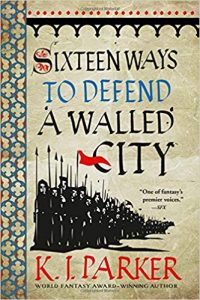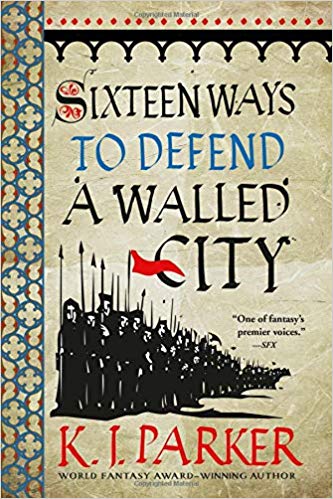 Parker, K.J. Sixteen Ways to Defend a Walled City. New York: Orbit, 2019.
Parker, K.J. Sixteen Ways to Defend a Walled City. New York: Orbit, 2019.
The school year’s done and I, as an overworked teacher, have a stack of books to tackle this summer. A few of them fall into a category of fiction I have recently discovered called “historical fantasy.” Essentially, these are books set in a quasi-Earth world that is very recognizable as a historical time and place in human history, but also fantastically different. Good examples of such books are Katherine Arden’s The Bear and the Nightingale (which I recommend) or A Discovery of Witches by Deborah Harkness (haven’t read, but hearsay makes it seem like a good fit).
The first book I read this summer, however, was K.J. Parker’s Sixteen Ways to Defend a Walled City. This book, hands down, was one of the best I have read in a long time. The plot is concerned with the defense of the capitol of a world-spanning empire, the eponymous “walled city,” and the main character is the famed leader of this city’s defense against insurmountable odds. It is witty, comedic, practical, and realistic in its approach to “what actually happens in a siege.”
So, why is Parker’s book historical fantasy?
Well, many students of history will recognize the titular city as a carbon-copy mesh of Rome and Constantinople. A highly defensible port with a landward wall system, it is geographically reminiscent of Constantinople, while all dates in the book are referenced as AUC, an abbreviation used in Rome to mean “From the Founding of the City” and how the Romans measured time (more or less). Chariot-races also play a huge role in the city and people’s factional allegiance to the different teams mirror the historical Greens and Blues who vied for political, economic, and social control of Constantinople during the Byzantine Empire’s heyday. Most characters from the imperial culture have Greek-like names, and the main character spends many a page praising the wondrous qualities of cement, an historical Roman invention. Seventh, auxiliary troops who fight alongside the City’s own legions play a big part in the plot. A universal, monotheistic religion even plays a large role in the City’s current life, though a mythological pantheon of deities had been worshiped in the distant past. This book isn’t just historical fiction, however; without giving any of the story away, certain fantasy elements make the City its own world apart from ours.
Even the manner this story is told seems to take inspiration from ancient historians. The dashing general of Caesar, heroically defending his nation, is there alongside Procopius’s scandalous expose on the dastardly doings of the royal family; Herodotus’ reliance of firsthand accounts lives alongside Anna Komnena’s desire to rehabilitate the image of her unjustly maligned father. Consequently, the book has the tone, style, and thematic effect of a grand historical narrative that scholars in 2019 would endlessly debate and decipher so we can discern the truth, hyperbole, contextualization, and lies in our own knowledge of and understanding of the past.
Lastly, this novel is also a work of historical fantasy, because, like all narrative history in some way (notice here I didn’t say ‘good’ history, but ‘narrative’ history), it tells a darn good story. I recommend it as a fast read for the summer. It took me a few hours in the afternoon to devour the book. Pick it up for a plane ride, sit with it on the beach, read it behind your screen at work when everyone else is on vacation and you’re stuck punching numbers (but don’t blame me if your boss catches you!) and enjoy a tale that is remarkably Roman, quintessentially Byzantine, eminently familiar, and full of its own surprising twists and turns.
P.S. All historical authors I mentioned have easily accessible translations of their work on the Perseus Project or Project Gutenberg. If you want to read ancient Roman or Byzantine history as its participants experienced it, take a look!
